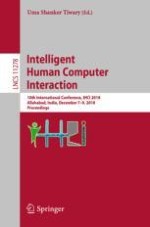2018 | OriginalPaper | Chapter
Social Choice Theory Based Domain Specific Hindi Stop Words List Construction and Its Application in Text Mining
Authors : Ruby Rani, D. K. Lobiyal
Published in: Intelligent Human Computer Interaction
Publisher: Springer International Publishing
Activate our intelligent search to find suitable subject content or patents.
Select sections of text to find matching patents with Artificial Intelligence. powered by
Select sections of text to find additional relevant content using AI-assisted search. powered by
